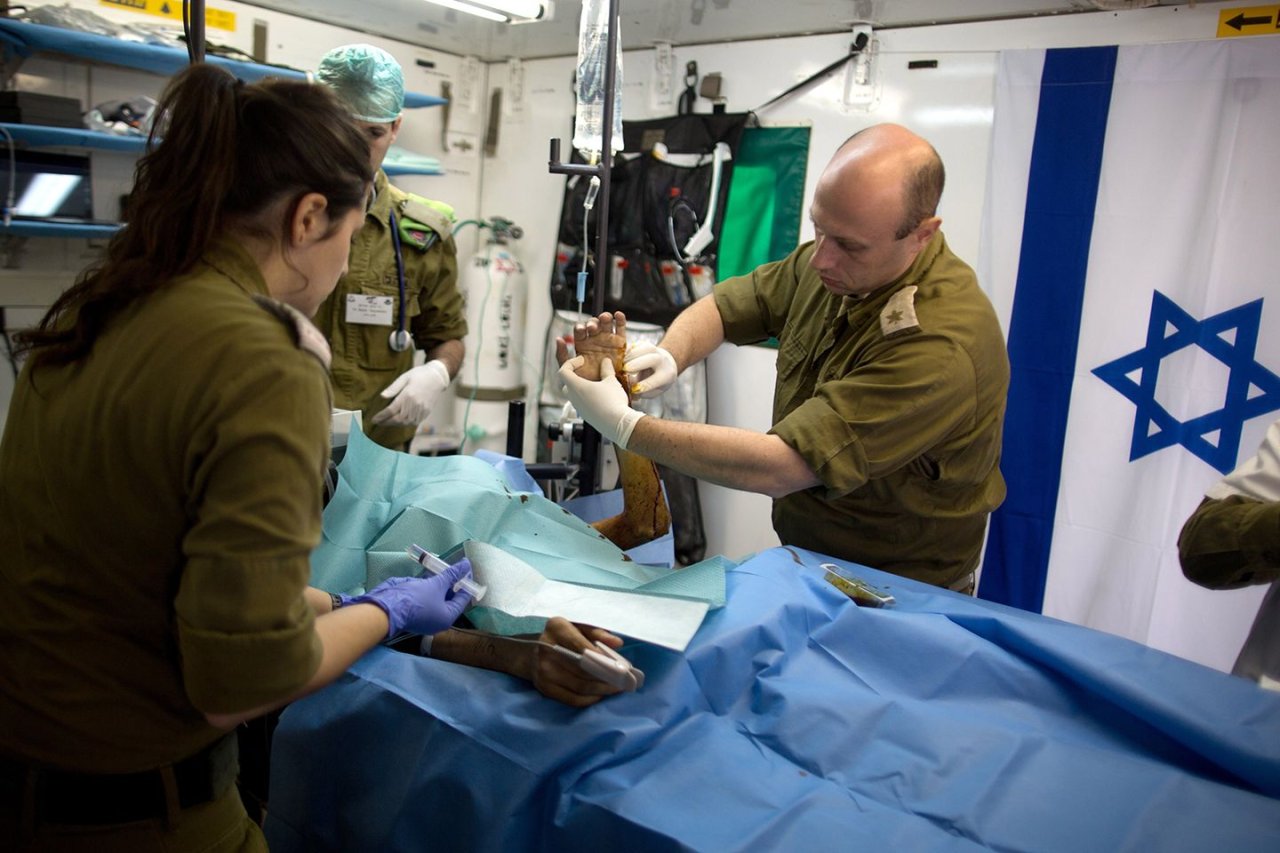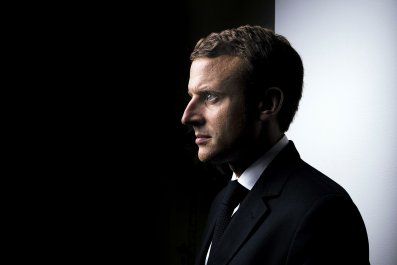Hani's mother warned him as a boy in Syria that if he didn't finish his dinner, Zionists would come and drink his blood. Yet when his own government shot him as he fled with his wife and children, he asked field medics to take him to Israel.
With half of Hani's face missing, Israeli soldiers searched him for weapons before bringing him to the Galilee Medical Center in Nahariya. Two years later, he is still undergoing extensive reconstructive surgery. "I heard from other Syrians who had been here that Israel takes good care of us, unlike Arab countries," he says.
Syria has never recognized the creation of the state of Israel, forbids anyone with an Israeli passport from visiting and has been at war with its neighbor since Israel's creation in 1948. Yet Israel's "good neighbor" policy has led to a significant, albeit subtle, shift in this region that could have vast implications for the future of the Middle East. As the Syrian war nears its eighth year, the atrocities of President Bashar al-Assad, combined with an Israeli policy that has provided medical care and humanitarian aid to Syrians, may give Israel a path forward in a region that has long resisted its existence.
"This is an opening that has never happened in 100 years of history between Israel and Syria," says Shadi Martini, director of humanitarian relief at the Multifaith Alliance for Syrian Refugees. "And I think it's going to continue to develop."
But as with everything in the Middle East, it's complicated. Assad has regained control of the Syrian side of the Golan Heights for the first time since 2011, leading Israel to halt its aid, at least for now. Some Syrians, who expected Israel to prevent Assad's return, view this as a betrayal.
In July 2017, the Israel Defense Forces opened up about the Operation Good Neighbor program. The IDF stated that it started in 2016, yet according to its architect, retired Lieutenant Colonel Marco Moreno, it effectively began in 2012, with talks between Syrians and Israelis. When Syria's war broke out in 2011, during the Arab Spring, the IDF didn't know what to expect.
"Some people thought the opposition might become terror groups," says Moreno of a fear that later materialized with the rise of the Islamic State militant group (ISIS) and the Nusra Front. "So we said, 'Let's do something different. Let's be good neighbors.'"
The IDF began by working with individual activists and aid workers, then with moderate groups and the Free Syrian Army, a loose coalition of opposition forces that includes former members of the Syrian military. "We told them, 'We'll help you with humanitarian aid," says Moreno.. "You make sure the terror groups don't take hold of your movement."
Since 2013, Israel has treated over 5,000 wounded Syrians in state-run public hospitals and at least another 7,000 at field hospitals and clinics operated by the Israeli military along the border. In 2017 alone, officials say, the country provided more than $31 million in aid to Syrian, officials say. The Galilee Medical Center has attended to 2,500 of those wounded, including 1,000 in the past year.
That uptick, says surgeon Eyal Sela, is the result of Syrians like Hani returning from Israel and spreading the word that their worst enemy is actually their friend. A mother whose daughter was receiving treatment told Sela they weren't allowed to utter the word Israel in their homes. But, as in most Israeli hospitals, the medical center's staff is half Arab and half Jewish. "When Syrians see Jews and Arabs working and laughing together, it changes their perspective about Israel," says Sela, who notes that all medical records Syrians take home are in Arabic, never Hebrew, to assure their safe return. Patients also notice that doctors usually place Syrians before Israeli patients, who have less serious injuries
At the start, Israelis needed more convincing about the program than Syrians. "The IDF doesn't always think outside the box," says Moreno, who now works for a Christian aid group operating in Syria. "You know, the army isn't all about peace and love."
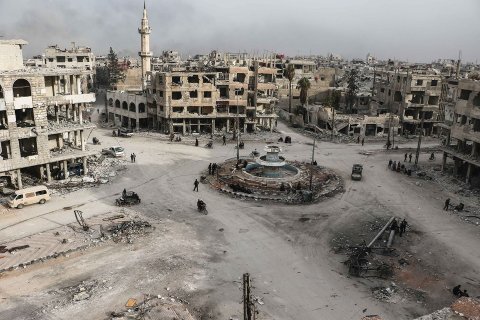
It felt strange at first for Sela too, but now Syrians "are part of the scenery." And Israelis are not complaining. A July poll by the Israel Democracy Institute found that 78 percent of Israeli Jews support their government's aid to Syrian victims of the war. However, the same poll revealed that 80 percent support their government's stance against absorbing Syrian refugees. Upon completing their treatment in Israel, wounded Syrians must return home.
Israel's aid also comes with self-interest. The pragmatic strategy has its roots in the military's early assessment of the chaotic situation on its northern border. And it's a strategy that seems to have worked: Not a single shot has been fired at Israeli forces by the Syrian opposition.
The melting of hostilities toward Israel has become even more palpable in recent months, as Assad's forces—backed by Russian airpower—launched a massive offensive to retake southern Syria. In early July, as the regime conquered Daraa, the birthplace of the revolution, some 300,000 civilians fled toward the Jordanian and Israeli borders, with thousands camping on the Syrian side of Israel's border fence. The displaced accused Assad of using Israel as a scapegoat. "Now, the Syrian people know who our real enemy is. It is Assad, Iran and Russia. Not Israel," says Musa Abu Al Bara'a, a Syrian opposition activist.
On July 17, over 200 Syrians demonstrated along the border fence, begging Israel to protect them from the onslaught of Assad's forces. The last time a mass demonstration of Syrians took place on Israel's border was in May 2011. That day, 100 protesters, out of 1,000, breached the fence and attacked Israeli soldiers. One Syrian was killed, dozens wounded, and an Israeli soldier was hospitalized after a large rock was thrown at his face.
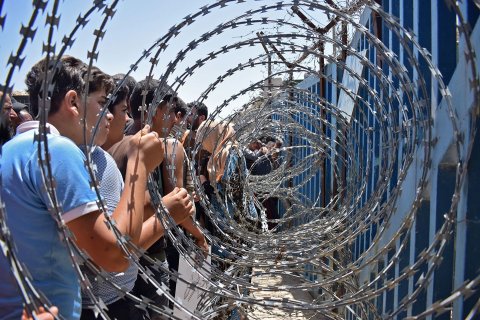
The difference between the demonstrations, seven years apart, is symbolic of just how much has changed. "We had to flee our homes to escape—not from Israeli attacks or aggression but from Assad and Russian attacks," says Mohammed Sharaf, a Syrian activist who took part in the peaceful march to Israel's border in July. "Contrary to what we were taught to believe, Israel has helped us. This is why we are asking for Israeli protection, because we are in serious danger from the Russian airstrikes over our heads."
Israel's support for civilians in southern Syria led them to expect refuge when Assad's forces swept through the area. Opposition activists even hoped Israel would help them topple Assad. In recent weeks, however, Israel has shown a willingness to cooperate with the Russian-backed campaign to retake areas controlled by opposition forces.
"People thought since this area would be taken over by the Assad regime and his partners—not only Russia but also Iran—that somehow it would be considered a danger to Israel [and] it would help the opposition retain control of this area," says Martini, of the Syrian refugee alliance. "Of course, that didn't happen, and so people feel let down."
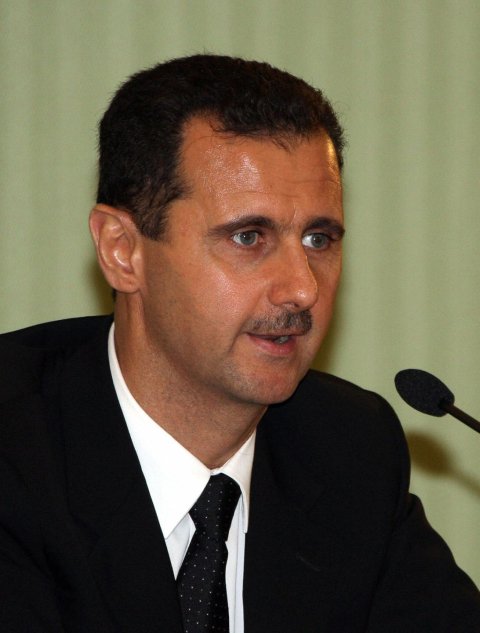
In late August, after Assad's forces retook control of southern Syria, feelings of betrayal remained, Martini says. "But the transformation that occurred—compared to the past, where people wouldn't even dare mention the word Israel—it's huge." While putting aid on hold may be a setback, Martini adds, "they aren't going to forget what the Israelisdid to help them, even if these programs are halted."
Back in the Galilee Medical Center, Hani is wearing hospital scrubs in blue and white, Israel's national colors. He can't wait to get back to his family in Syria. "I wish we had peace where Israelis could come to Syria and we could go to Israel," he says. "But not as refugees."



